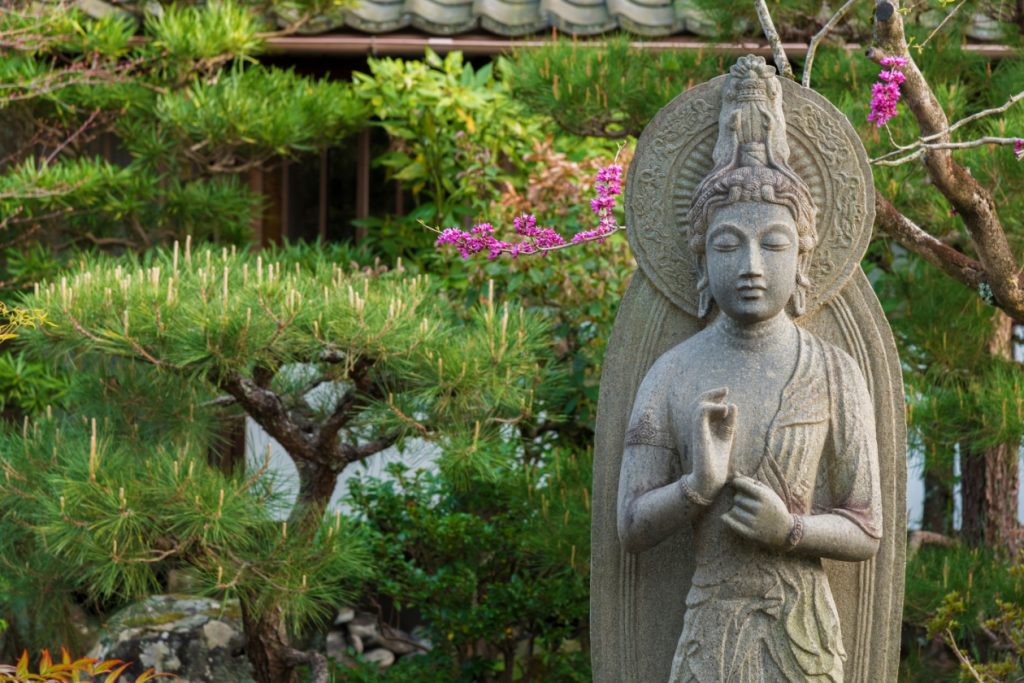The following is an edited extract from a seminar that Urgyen Sangharakshita held at Padmaloka Retreat Centre, 12–13 March 1983. The seminar was on chapter 9 of the Dhammapada, and this extract is on the first verse of that chapter (verse 116).
Earlier this year we published two articles by Subhuti – The Ascent of Beauty and The Aesthetic Moment – in which he explored the pursuit of beauty as a spiritual path. In this seminar extract Sangharakshita comments on the Buddha’s statement that ethical actions are beautiful.
Be quick to do what is (morally) beautiful. Restrain the mind from evil. He who is sluggish in doing good, his mind delights in evil.
Sangharakshita says: This translation is my own, and I have translated this first sentence a little differently from the way in which it is usually translated, though not in any way eccentrically, but completely literally. The word I have translated as beautiful is kalyāṇa. An even more literal translation would be ‘Be quick in the beautiful’, that is the Pāli idiom, but the meaning is to be quick in the doing of that which is morally beautiful. The word kalyāṇa is quite important, as in kalyāṇa mitratā. We usually translate it as ‘spiritual friendship’, but we could just as well speak of beautiful friendship, or lovely friendship. So we could translate this as ‘Be quick to do what is lovely’ – lovely in the moral sense.
In bringing out the fact that what is usually spoken of as the good is also the beautiful – not so much in the purely aesthetic sense, but in the sense of the morally beautiful – I am making the point that ethics is not a question of dos and don’ts. It is basically a question of being attracted towards an appealing ideal. That assumes that you have some sensitivity to what is kalyāṇa, that you are capable of being affected by it, responding to it. If someone has no sense of what is morally beautiful, perhaps he has to be restrained by dos and don’ts, but if one can simply feel the beauty of the ethical ideal, that is a much better way of going about things.
What exactly do we mean by moral beauty? Well, what do we mean by beauty? An important element is attractiveness. The beautiful appeals to us, and the morally beautiful appeals to our ethical sense; an action seems to us fine, noble, lovely, beautiful. One could think of Socrates’ voluntary death for the sake of standing by the principles which he believed in as ethically beautiful. But why does it impress us in that sort of way? It is moving to read, but it also seems fitting, appropriate. One might say that that appropriateness has a sort of elegance. Sometimes mathematicians talk about an elegant mathematical demonstration. It has an element that appeals to an aesthetic sense, not just to the sense of truth. In the same way, the morally beautiful action doesn’t just appeal to the moral sense; it also appeals to the aesthetic sense. It seems to be elegant, fit, appropriate. There is something in human nature that derives deep satisfaction from contemplating the good, a satisfaction that is almost aesthetic in nature, like the satisfaction that you get from great art, as though a great ethical action has an artistic value.
But even if we are attracted by the morally beautiful, we tend not to do it very quickly. Sometimes we have an impulse of generosity, but unless we act upon it immediately, we have second thoughts. Someone might be in need of money and your immediate response is to give them ten pounds, but if you don’t give it on the spot, after a while you’ll start thinking that maybe they could manage with five. If a further period elapses, you might think that they don’t need it all that much, but you’d better give something, so you give two. You quickly perceive the moral beauty of the ethical action when it is suggested to you, but if you don’t act upon that response, that can have fatal consequences. So you must be quick to do what you perceive as being the morally beautiful thing to do; otherwise all sorts of other forces and factors may arise and prevent you from carrying out your original intention.
[…]
… it is quite important that ethical ideals should be embodied in aesthetically pleasing forms. This is a great feature of the best Buddha images, which embody the ideal of Enlightenment in an aesthetically attractive and inspiring human form. An example from Greek history is that of Alcibiades, who could always sway the Athenians. He had only to make a speech and they would follow him, because he was the tallest and the most handsome of the Athenians and exercised great influence over them, though unfortunately he didn’t always give them good leadership. He seems to have been a rather slippery customer, even though he had been associated with Socrates in his younger days.
Ethical actions which are unskilful, unbeautiful, are sometimes performed in a superficially beautiful way. Even though they were doing things that were quite unbeautiful, their style could be beautiful, they could act with a sort of elegance, and that might take in someone whose perception of beauty didn’t go very deep. For instance, there was the late Madame Chiang Kai-shek, the wife of Generalissimo Chiang Kai-shek. She was a very elegant lady, one of the famous Soong sisters. Apparently at a dinner party in New York, someone asked her how it was that she and her husband had no trouble with the opposition. Apparently she gave a beautiful smile and drew her elegant gloved hand across her throat. What she was saying was unethical, unbeautiful, and although she did it with a certain style, a beautiful gesture, it was quite hideous, and the fact that she did it with style made it worse because the glaring contrast between the ugliness of what she was saying and the superficial elegance with which she said it was so shocking.
Conversely, someone can do a beautiful action, but clumsily. It might be that you are in need of money, and someone comes and gives you some. They have no social graces, they do it inelegantly, but you can see the generosity there, so the beauty of the action shines through that lack of superficial elegance, that lack of manners or culture. In the same way, you should be able to see the ethical ugliness of an action manifesting itself despite the superficial charm. One mustn’t be misled by someone’s smart suit or beautiful car. The fact that someone has a beautiful Oxford accent shouldn’t prevent one from perceiving that what he is saying is quite ugly, though that can be difficult to spot.
[…]
It seems to be important to instil early in life the idea that the good is the beautiful, that the ethical life is attractive and inspiring, not dull and depressing. It is quite important in the case of Buddhism that whatever embodiments of our spiritual and ethical ideals we have around us are beautiful, that their form does justice to their content. I don’t mean that we should prettify the ideal, but we should make sure that the genuine beauty of the ideal is allowed to manifest.
With thanks to the Sangharakhita Literary Executors Coordinator for allowing us to publish this extract. The whole of the seminar will soon be published in The [Sangharakshita] Complete Works, vol.15, Pali Canon Teachings and Translations p.348ff.

